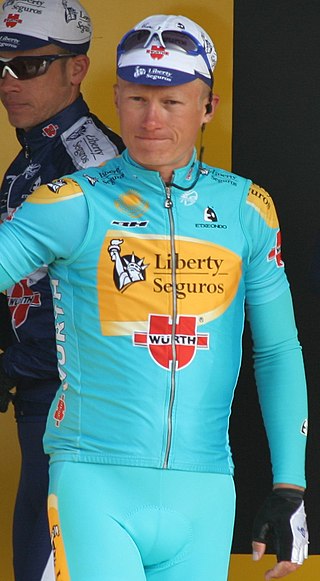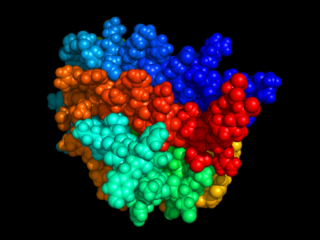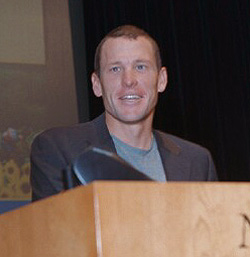Related Research Articles

Bjarne Lykkegård Riis, nicknamed The Eagle from Herning, is a Danish former professional road bicycle racer who placed first in the 1996 Tour de France. For many years he was the owner and later manager of the Oleg Tinkov associated Russian UCI WorldTeam Tinkoff–Saxo. Other career highlights include placing first in the Amstel Gold Race in 1997, multiple Danish National Championships, and stage wins in the Giro d'Italia. On 25 May 2007, he admitted that he placed first in the Tour de France using banned substances, and he was no longer considered the winner by the Tour's organizers. In July 2008, the Tour reconfirmed his victory but with an asterisk label to indicate his doping offences.

Richard Virenque is a retired French professional road racing cyclist. He was one of the most popular French riders with fans for his boyish personality and his long, lone attacks. He was a climber, best remembered for winning the King of the Mountains competition of the Tour de France a record seven times, but he is best known from the general French public as one of the central figures in a widespread doping scandal in 1998, the Festina Affair, and for repeatedly denying his involvement despite damning evidence.

The 1998 Tour de France was the 85th edition of the Tour de France, one of cycling's Grand Tours. The 3,875 km (2,408 mi) race was composed of 21 stages and a prologue. It started on 11 July in Ireland before taking an anti-clockwise route through France to finish in Paris on 2 August. Marco Pantani of Mercatone Uno–Bianchi won the overall general classification, with Team Telekom's Jan Ullrich, the defending champion, and Cofidis rider Bobby Julich finishing on the podium in second and third respectively.

Filippo Simeoni is an Italian former racing cyclist and the 2008 Italian road race champion. Simeoni won two stages in the Vuelta a España in 2001 and 2003, and the 2008 Italian National Road Race Championship.
Willy Voet is a Belgian sports physiotherapist. He is most widely known for his involvement in the Festina affair in the 1998 Tour de France.
Michele Ferrari is an Italian physician, cycling coach and author, who is mostly known for his role in supplying bicycle racers with performance-enhancing drugs, notably EPO. His most famous client was Lance Armstrong.
Christophe Bassons is a French former professional road racing cyclist. His career ended when he spoke out about doping in the Tour de France.

There have been allegations of doping in the Tour de France since the race began in 1903. Early Tour riders consumed alcohol and used ether, among other substances, as a means of dulling the pain of competing in endurance cycling. Riders began using substances as a means of increasing performance rather than dulling the senses, and organizing bodies such as the Tour and the International Cycling Union (UCI), as well as government bodies, enacted policies to combat the practice.
Francesco Conconi is an Italian sports doctor and scientist, with disciples such as Michele Ferrari and Luigi Cecchini. Conconi is a professor at the University of Ferrara in Italy where he heads the Centro Studi Biomedici Applicati allo Sport or Biomedical Research Institute. His research focused on tracing techniques for doping substances but he is better known for his doping activities and is said to have introduced Erythropoietin or EPO to the sport of cycling. Conconi is most famous for having prepared Francesco Moser for his successful attempt to break the world hour record in Mexico, 1984.
The Festina affair was a series of doping scandals within the sport of professional cycling that occurred during and after the 1998 Tour de France. The affair began when a large haul of doping products was found in a support car belonging to the Festina cycling team just before the start of the race. A resulting investigation revealed systematic doping involving many teams in the Tour de France. Hotels where teams were staying were raided and searched by police, confessions were made by several retired and current riders, and team personnel were arrested or detained. Several teams withdrew completely from the race.

The 2007 Tour de France was affected by a series of scandals and speculations related to doping. By the end of the Tour, two cyclists were dismissed for failing tests and the wearer of the yellow jersey was voluntarily retired by his team for lying about his whereabouts and missing doping tests. A fourth rider was confirmed to having used doping while in a training session prior to the 2007 Tour and a fifth rider failed tests late in the race, with his result being officially announced just after the end of the Tour. During the competition, two teams were asked to withdraw after at least one member was found to have doped.

Erythropoiesis-stimulating agents (ESA) are medications which stimulate the bone marrow to make red blood cells. They are used to treat anemia due to end stage kidney disease, chemotherapy, major surgery, or certain treatments in HIV/AIDS. In these situations they decrease the need for blood transfusions. The different agents are more or less equivalent. They are given by injection.

Festina was a former professional cycling team that was active in the professional peloton from 1989 to 2001. The team was sponsored by the Swiss watch manufacturer of the same name.
Gewiss–Ballan was an Italian-based road bicycle racing team active from 1993 to 1997, named after the Italian electrical engineering company Gewiss. The team was successful in the Giro d'Italia and the Tour de France as well as several classics during the early 1990s.

Lance Edward Armstrong is an American former professional road racing cyclist. He achieved international fame for winning the Tour de France a record seven consecutive times from 1999 to 2005, but was stripped of his titles after an investigation into doping allegations, called the Lance Armstrong doping case, found he used performance-enhancing drugs over his career. He is currently banned for life from all sanctioned bicycling events.

For much of the second phase of his career, American cyclist Lance Armstrong faced constant allegations of doping, including doping at the Tour de France and in the Lance Armstrong doping case. Armstrong vehemently denied allegations of using performance enhancing drugs for 13 years, until a confession during a broadcast interview with Oprah Winfrey in January 2013, when he finally admitted to all his cheating in sports, stating, “I view this situation as one big lie that I repeated a lot of times”.
At the time of the 1999 Tour de France there was no official test for EPO. In August 2005, 60 remaining antidoping samples from the 1998 Tour and 84 remaining antidoping samples given by riders during the 1999 Tour, were tested retrospectively for recombinant EPO by using three recently developed detection methods. More precisely the laboratory compared the result of test method A: "Autoradiography — visual inspection of light emitted from a strip displaying the isoelectric profile for EPO", with the result of test method B: "Percentage of basic isoforms — using an ultra-sensitive camera that by percentage quantify the light intensity emitted from each of the isoelectric bands". For those samples with enough urine left, these results of test method A+B were finally also compared with the best and latest test method C: "Statistical discriminant analysis — taking account all the band profiles by statistical distinguish calculations for each band".
The year in which the 1998 Tour de France took place marked the moment when cycling was fundamentally shattered by doping revelations. Paradoxically no riders were caught failing drug tests by any of the ordinary doping controls in place at the time. Nevertheless, several police searches and interrogations managed to prove existence of organized doping at the two teams Festina and TVM, who consequently had to withdraw from the race. After stage 16, the police also forced the virtual mountain jersey holder Rodolfo Massi to leave the race, due to having found illegal corticosteroids in his hotel room. The intensive police work then led to a peloton strike at stage 17, with a fallout of four Spanish teams and one Italian team deciding to leave the race in protest.
The 1994 La Flèche Wallonne was the 58th edition of La Flèche Wallonne cycle race and was held on 20 April 1994. The race started in Spa and finished in Huy. The race was won by Moreno Argentin of the Gewiss–Ballan team. Argentin and his teammates, Giorgio Furlan and Evgeni Berzin had escaped from the pack 72 km (45 mi) from the finish, never to be caught again.
References
- ↑ "Disparition du Docteur Rijckaert". Sport.fr. Archived from the original on 2005-02-01. Retrieved 2008-04-08.
- ↑ "La Mort d'Eric Rijkaert Cyclisme dopage.com". Cyclisme dopage. Retrieved 2008-04-08.
- ↑ "Luc Leblanc : " Nous vivons dans un monde d'hypocrites !" . Retrieved 2008-04-08.[ dead link ]
- 1 2 "Eric Rijckaert's new book" . Retrieved 2008-04-08.
- 1 2 Eric Rijckaert Archived 2007-08-13 at archive.today
- ↑ "O'Grady wears the jersey, but Blijlevens wins the stage". BBC News. 1998-07-16. Retrieved 2008-04-08.
- ↑ "Festina-dokter Eric Rijckaert wil met boek dopingdiscussie opentrekken". Archived from the original on 2008-03-27. Retrieved 2008-04-08.
- ↑ "Eric Ryckaert, l'ancien médecin de Festina, condamné pour dopage". Cyclisme dopage. Retrieved 2008-04-08.